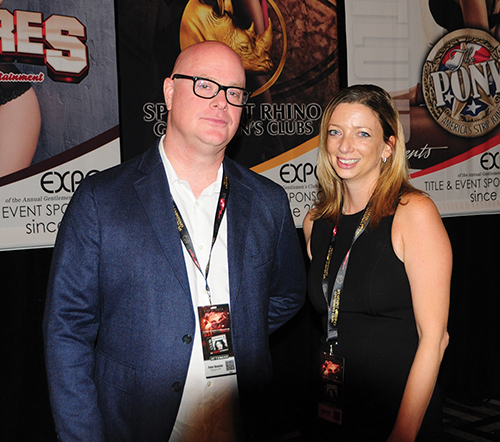In keeping with the 2018 Expo’s “Party Business” theme, our “Promoting the Party” seminar centered around modern-day marketing and what online methods our experts would use to promote a party or special event at a strip club.
Just imagine you have this phenomenal event planned for your strip club. You’ve got the theme, matching outfits, decorations and even your staff is pumped up. But how do you alert the world, namely the clamshell that is 20-somethings, about your event?
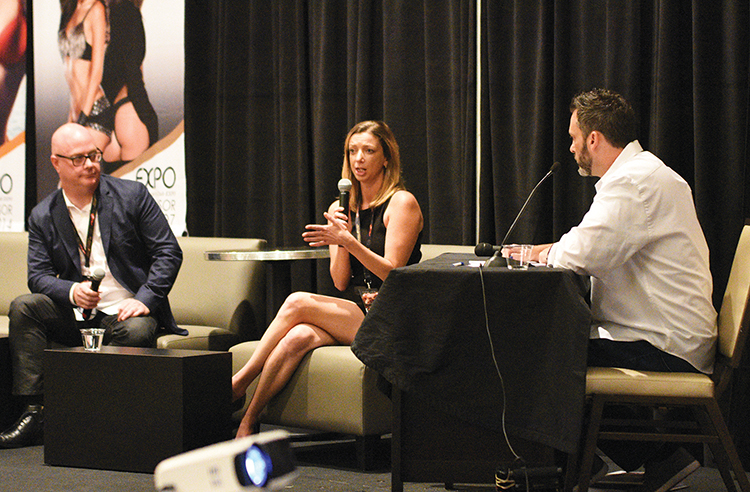
If your idea of marketing isn’t too far removed from The Flintstones, welcome to the new age with our experts’ proven modern marketing tactics. At EXPO 2018, two social media marketing experts—Jenna Gross and Pete Housley—answered the questions of moderator Dave Manack (ED Publications’ Associate Publisher) on the subject of how to promote a party or special event on the internet.
Jenna Gross is the Chief Marketing Officer with Moving Targets, a company which creates and executes measurable marketing campaigns across established and emerging platforms. Pete Housley is the CEO of Admit VIP, a boutique venue, box office and entertainment management and consulting firm for numerous nightclubs, bars and venues throughout the U.S.
MANACK: What are the first steps a club should take when starting to promote a party or special event?
GROSS: You have to plan far enough in advance. You can’t just post a flyer and expect the night to be successful. You have to have a (social media) plan mapped out for before the event, during and after, to get the most mileage out of it. Define what success looks like in terms of social platforms and know what’s working and what’s not going to work and you can use data of previous events and other things you know, other engagements on your social channels to give you more of a road map on where to go with it.
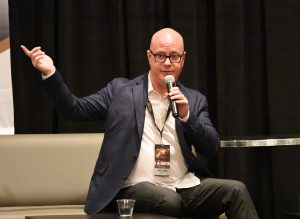 HOUSLEY: The first thing you have to do when you’re building an event is identify who you are trying to talk to. Monday Night Football is coming up, right? So everybody, everybody in this room should be doing something for football. How do we talk to that market? I think you start thinking about how you’re different than every other event in that space. Gentlemen’s clubs have a special issue trying to also compete now with mainstream clubs that are more risqué.
HOUSLEY: The first thing you have to do when you’re building an event is identify who you are trying to talk to. Monday Night Football is coming up, right? So everybody, everybody in this room should be doing something for football. How do we talk to that market? I think you start thinking about how you’re different than every other event in that space. Gentlemen’s clubs have a special issue trying to also compete now with mainstream clubs that are more risqué.
MANACK: How can you still utilize Facebook, given the fact there are these restrictions on adult-oriented businesses?
GROSS: It’s not dead, the rules have just changed a lot and everybody just needs to adapt, the same with any other channel. It’s really about making engaging content on there as opposed to getting a lot of fans, getting a lot of Likes. The more engaging your content is, the more people will then see it.
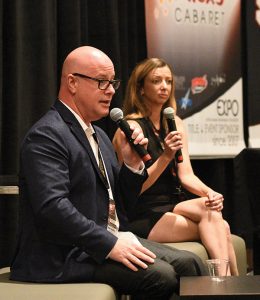 HOUSLEY: One of the things that works for Facebook is post-engagement. Sometimes you’re better off to kind of step back and then, after the event, do some post-party coverage. For one reason, you get more capability of controlling what that content looks like, so you don’t have to necessarily be that risqué with that content. I do an event with a couple of clubs in town called Stripper Karaoke. It’s a fun event, but the pictures and the videos that come out of it are just as hilarious, and we have found a way to make those work in social media. We can control what that content looks like. But that’s engagement for me, these are we engage these audiences, they come back to see that content. They’re not there to see just ad after ad after ad.
HOUSLEY: One of the things that works for Facebook is post-engagement. Sometimes you’re better off to kind of step back and then, after the event, do some post-party coverage. For one reason, you get more capability of controlling what that content looks like, so you don’t have to necessarily be that risqué with that content. I do an event with a couple of clubs in town called Stripper Karaoke. It’s a fun event, but the pictures and the videos that come out of it are just as hilarious, and we have found a way to make those work in social media. We can control what that content looks like. But that’s engagement for me, these are we engage these audiences, they come back to see that content. They’re not there to see just ad after ad after ad.
MANACK: What’s your rule of thumb for posts that relate to an event as opposed to fun posts and what suggestions could you offer in terms of posts to engage people?
GROSS: Facebook’s a business, so they’re never going to get rid of business pages. They’re going to do what they can to keep promoting them organically. As long as your post is engaging enough, asking questions, making it about your fans as opposed to just blasting them with stuff. They won’t eradicate businesses from your news feed, you just have to try a little bit harder, especially in this industry because you can’t do things like run ads. Even when we do run ads for clubs, you should never boost a post; do it through ad managers so you can target a little bit more specifically and set restrictions on who sees your post.
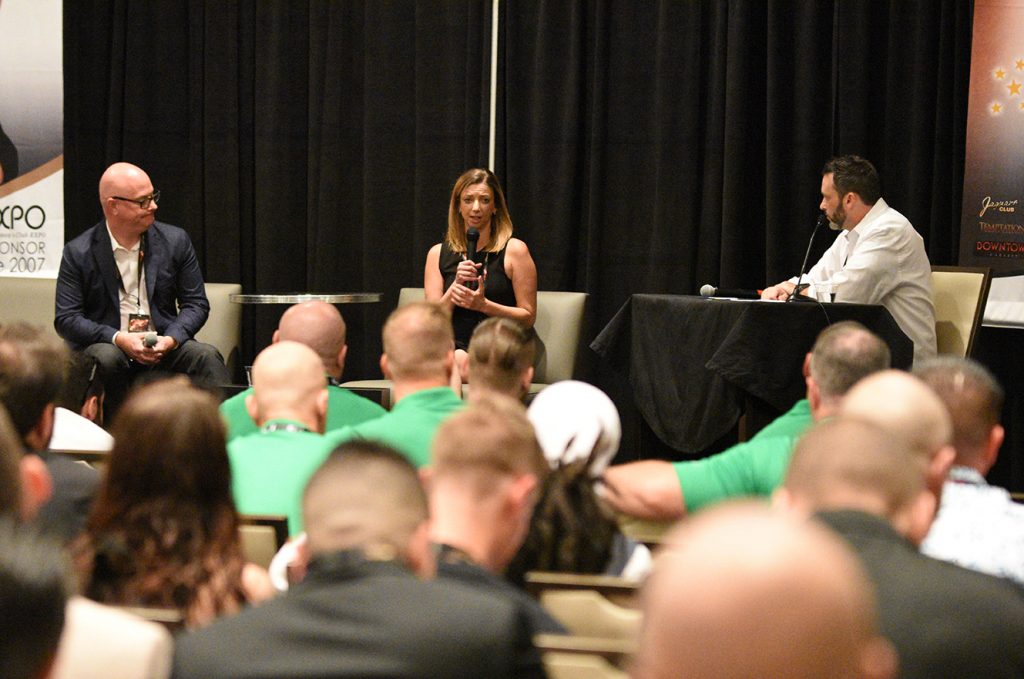
HOUSLEY: A lot of times when you hire a social media marketing company, they sit there and push out noise and it’s supposed to be engaging, but often I don’t find that too terrifyingly engaging. If you’re a club in Florida, then ask a question: “Hey, we’re talking to Lexi Belle, Bella Danger and Holly Hendricks, who would you guys like to see?” The polls are there. That’s a great opportunity to engage with those guys.
Sometimes you’re better off to kind of step back and then, after the event, do some post-party coverage. For one reason, you get more capability of controlling what that content looks like, so you don’t have to necessarily be that risqué with that content. – Pete Housley
MANACK: Outside of Facebook, what social media platforms have you guys had success with in terms of promoting events or clubs?
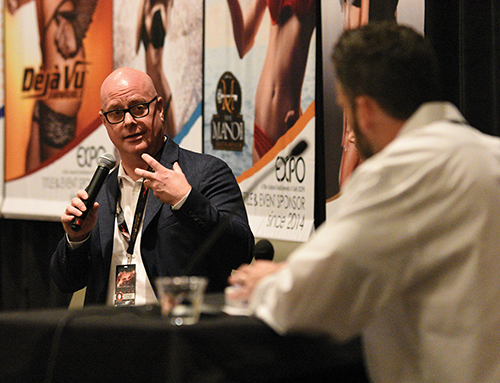
GROSS: I like Instagram because there’s such a visual nature to it. That seems to be kind of the way everyone’s talking about how things are going on. You can also put a call to action on it now that can take you to your events page, different stuff on your website, but just the visual nature of Instagram, I think is a perfect fit for clubs.
Also, with Snapchat their advertising is now a lot cheaper than it used to be. If you’re trying to reach a younger audience, you can send them to events page with filters or just direct ads.
HOUSLEY: I think everybody should be participating on Twitter. I think the engagement on Twitter is different than it is in any other platform. I think some traditional stuff still works—press releases, dealing with blogs, all those kinds of things still work. They still work because that message gets out through somebody else’s social channel.
MANACK: How important are hashtags, especially when trying to promote an event?

GROSS: They’re very important, especially if you can tie hashtags you’re using into current events or what’s trending, as well as what market/locale you’re in. If you’re going to be using a hashtag for events, use a consistent hashtag. That way, it makes it more known than every single event having a new one and you have to try a lot harder to promote it.
HOUSLEY: The alternative to that is don’t go crazy with hashtags. I think that’s the most abusive part of social media. You go on Instagram, here’s a picture and there’s one-word description and then like 400 hashtags. And that’s just evident to the reader/consumer that you were just trying to get in people’s search feed. So we do the order ordered straight carpet every year. We always tagged that one differently because it’s a huge process.
















